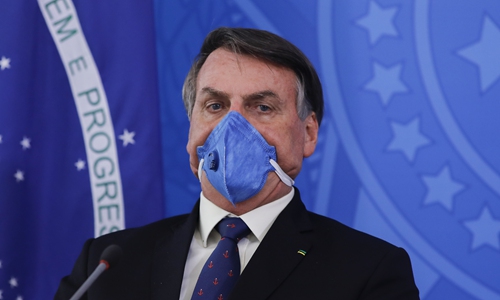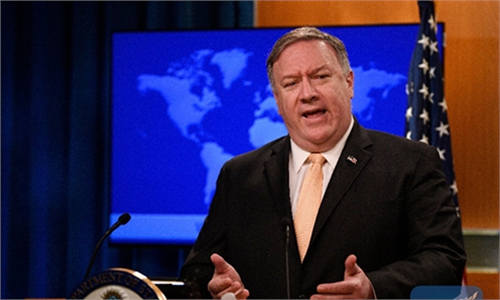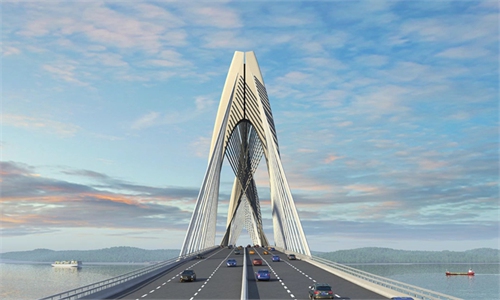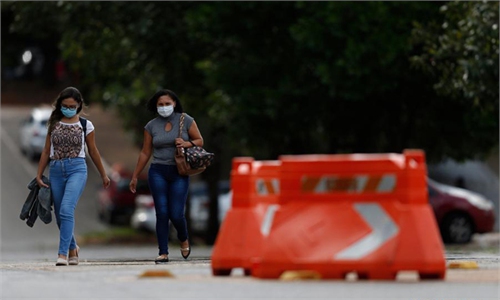
Brazilian president Jair Bolsonaro wears a face mask during a press conference on the coronavirus pandemic COVID-19 at the Planalto Palace in Brasilia, Brazil on Friday. Photo: AFP
Since China began clinical trials for its COVID-19 vaccines, the international public opinion manipulated by the West has always doubted the liability of these life-saving remedies. As a result, some countries initially expressed their concerns to use COVID-19 vaccines developed by China.However, Chinese-developed vaccines have performed steadily, as they were designed to. The World Health Organization (WHO) is assessing China's Sinopharm and Sinovac COVID-19 vaccines for "emergency use listing" status, and a decision could be made by March at the earliest.
As Western-developed vaccines are in short supply with uneven distribution, certain Western countries are now turning to Chinese vaccines.
Those who were deceived at first have realized that suspicion and resistance to China's vaccines came out of political and ideological aims and lacked scientific and factual basis.
Latin America was severely hit by the COVID-19 pandemic. Due to local people's perceptions of the virus, the inefficiency of social management, poor healthcare conditions, and some other factors, the continent is still suffering a lot. Blocking the infection chains by mass vaccination is tantamount to a life-saving straw for many local governments.
The US attaches special strategic importance to Latin America as its "backyard." After all, Washington's policies over Latin America ensure that countries on the continent serve the US' global strategy. Whether there is more of "carrots" or "sticks" with these policies depends on the specific requirements of Washington. Whether and how the US will assist Latin American countries with COVID-19 vaccines is also determined by the above-mentioned stances made by Washington.
The Biden administration planned to increase total vaccine orders for the US by 50 percent, from 400 million to 600 million. Given the limited production of vaccines by Pfizer, even Europeans countries that are traditional allies of the US have to undergo vaccine shortages. Latin American countries will not see them on top of the delivery list, even though some internationally renowned vaccine manufacturers have boasted that they would supply them. Therefore, some Latin American countries have also placed their hopes on vaccines developed by China and Russia such as Brazil and Argentina.
The Chinese government has always regarded COVID-19 vaccines developed by Chinese companies as public goods. It has actively responded to a request from the WHO with a plan to provide 10 million vaccine doses to developing countries through the global COVAX initiative.
The US, which clearly knows why its southern neighbors have extended the olive branch to China, should be willing to see this cooperation if it really wants to see the end of this nightmare and support humanity. No one is safe until everyone is.
It should be determined by scientists and the market which vaccines Latin American countries can trust and afford. However, being paranoid about geopolitical games with China, the former US government spared no efforts to stigmatize China. It worked hard to drive wedges between China and Latin American countries, and try to tether Latin American countries onto its anti-China chariot. As a result, hundreds of millions of Latin American people today are still facing the threats posed by virus as they still cannot have timely access to vaccines.
The US' tricks may have worked for some time, but they cannot always nail it, especially amid the raging pandemic. Take Brazil. Brazilian President Jair Bolsonaro followed the Trump administration's position with the COVID-19 fight. But Brazil's economy has been severely hit by the pandemic, and Bolsonaro has become aware that it is not feasible to focus on economy while neglecting the virus fight. Facing the fact that about 4.5 percent of Brazil's 213-million-population has been infected, Bolsonaro has no option but to implement mass vaccinations.
However, European and American pharmaceutical companies regard life-saving vaccines as profitable patented products and primarily consider how to maximize their own benefits. Therefore, their vaccines can only be monopolized by high-income countries.
By contrast, China has positioned its vaccines as public goods to help all of humanity. With this logic, Chinese companies have taken into consideration the accessibility and affordability of their vaccines for developing countries throughout the entire process of development and production.
Bolsonaro, who has made controversial remarks over China in the past year, must be undergoing complex feelings - especially after the Chinese government generously responded to his request over vaccines. On January 25 on Twitter, he expressed appreciation of the Chinese government's "sensitivity."
This is a signal that Bolsonaro has returned to rationality on many issues. This also echoes the proposition that China has persisted to make: People should put aside their prejudices and work together to battle the deadly virus that endangers all of humanity. In addition, China is now acting in a just way with vaccine allocation.
Abandoning "vaccine nationalism" and acting responsibly to the overall situation of the global pandemic fight is what the world urgently needs and all countries should strive to do.
The author is executive director of the Ibero-America Law Center of China University of Political Science and Law. opinion@globaltimes.com.cn



